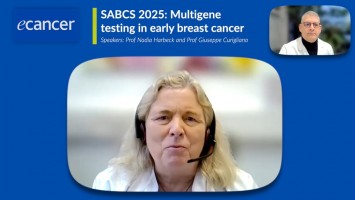EHA 2016
Better screening programmes needed for haematological malignancies such as leukaemia
Dr Brigitte Schlegerberger - Hannover Medical School, Hannover, Germany
This was haematology in focus so focussed clearly on clinicians meeting patients with leukaemia and for them just to educate them when should they think about familial background or genetic predisposition in their patients with leukaemia especially MDS, also AML or ALL.
There are some mutations that are very famous and in the public eye like BRCA mutations for breast cancer. When it comes to haematological malignancies what kind of concerns do you think clinicians should be aware of?
Of course if you mention BRCA1 we have made great changes in the field during the last decades. When we entered this field it was frightening and associated with a lot of anxiety and today we also do counselling in this field. Patients come and want and seek this information. I foresee that the situation will be the same for familial leukaemia; today it’s quite uncommon and neither the patients nor the clinicians think about familiarity at the first glance. But there are a certain proportion, a small proportion of patients, maybe 5%, maybe 10%, who have a genetic background. In the years to come I’m quite sure that this will be a specific focus also for the clinicians and patients.
You mentioned the clinicians and the patients as individuals, do you have any results from your presentation or any experience that you have of the two working together, any patient outcomes that have changed the way that clinicians practice?
Yes, of course. If you recognise that leukaemia in a patient is due to a gene mutation, for example in RUNX1 or, let’s say, in TP53 there was one example of a little child I presented yesterday. This has clear implication for treating this patient and fortunately the clinicians learned about the gene mutation in TP53 very early during the course of the disease and the immediate consequence was to avoid irradiation. I’m quite sure that this quite good clinical course was due to avoidance of this standard care treatment. Of course, this is knowledge that is not only important for the patient him or herself but it’s very important for the family. There might be unknown carriers of this gene mutation, healthy carriers, and we have the possibility, the opportunity, to go into screening programmes which are very different for the different gene mutations.
Are there any screening programmes being carried out in trials or across Europe at the moment?
This is a very important point because these familial leukaemias are rare, are clearly rare diseases, and I’m extremely happy that the EU now recognises rare cancers also as rare diseases and includes them, for example, in the new European Reference Networks. To come up with clear guidelines for screening programmes it’s extremely important to cooperate on a European level and to collect all these families, to collect the clinical courses, to correlate them with the specific gene mutations and then come up with real scientific evidence based guidelines. At the moment we are not there but we are currently entering the state and collecting the families we have, initiated European collaborations, and I hope that we come up with clinical guidelines in the next years.
Can you think of any ways that you could encourage clinicians or encourage families to be part of this screening?
Of course, this is why I’m here. I also speak for patients and parent organisations, not only the patients, we have many children with a genetic predisposition and now the patients and also the parents seek this information and want to learn more what’s the impact on their lives. What I would recommend and really ask for is to contact us in these European and also international consortia so that we can really move forward.
That’s all the questions I had prepared, is there anything that you would like to add?
No, I just want to really thank all the collaborators but especially the patients and parents.








